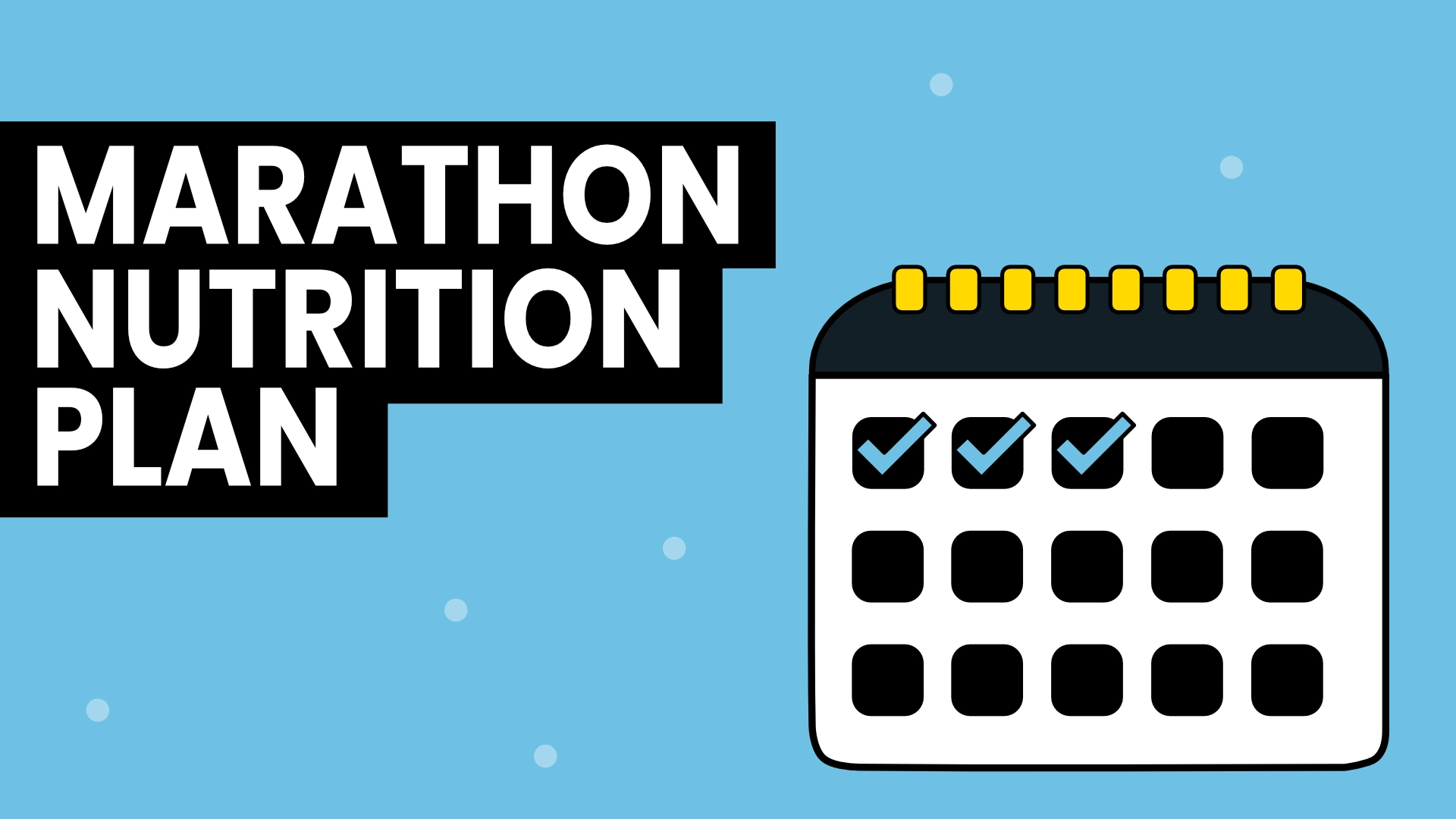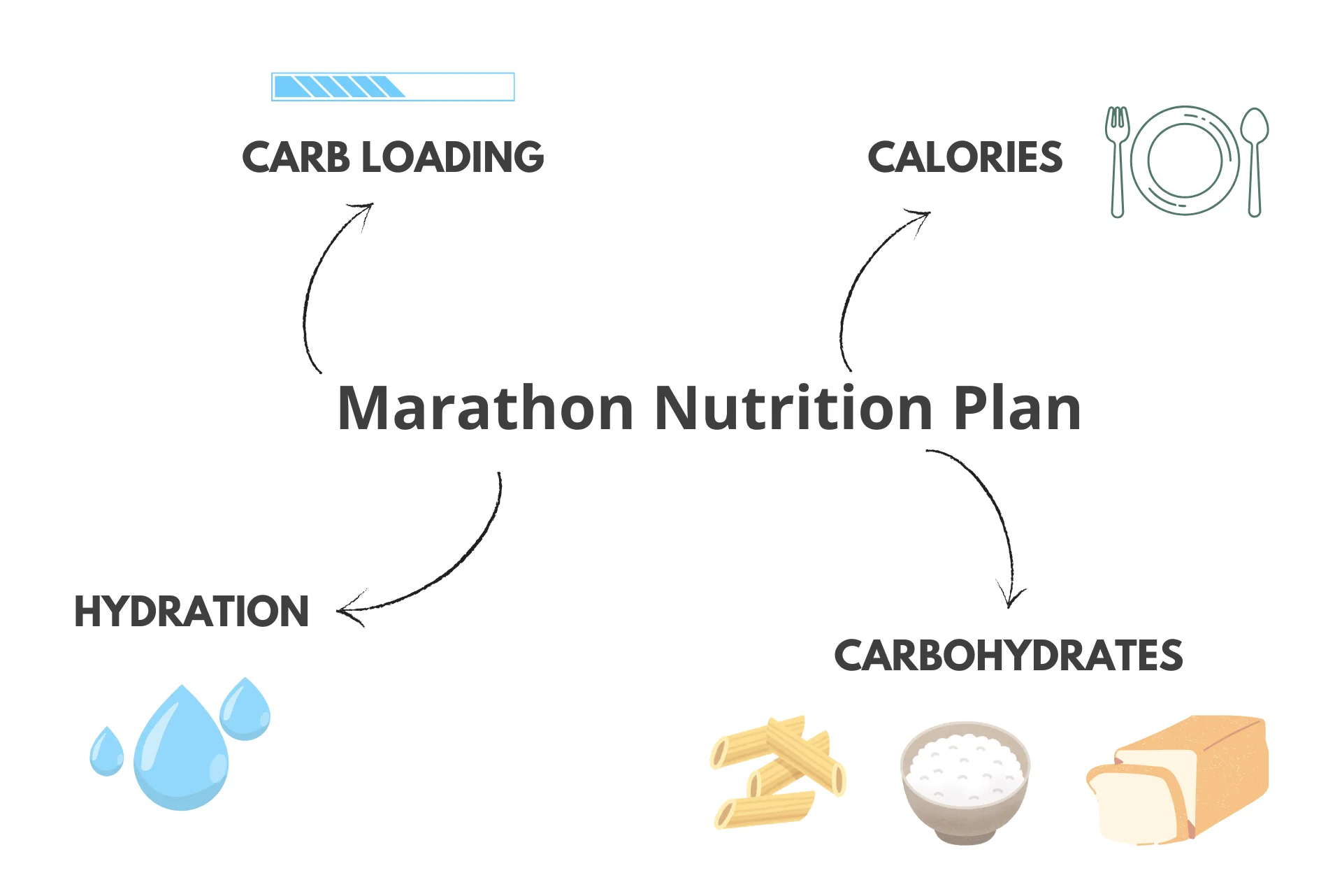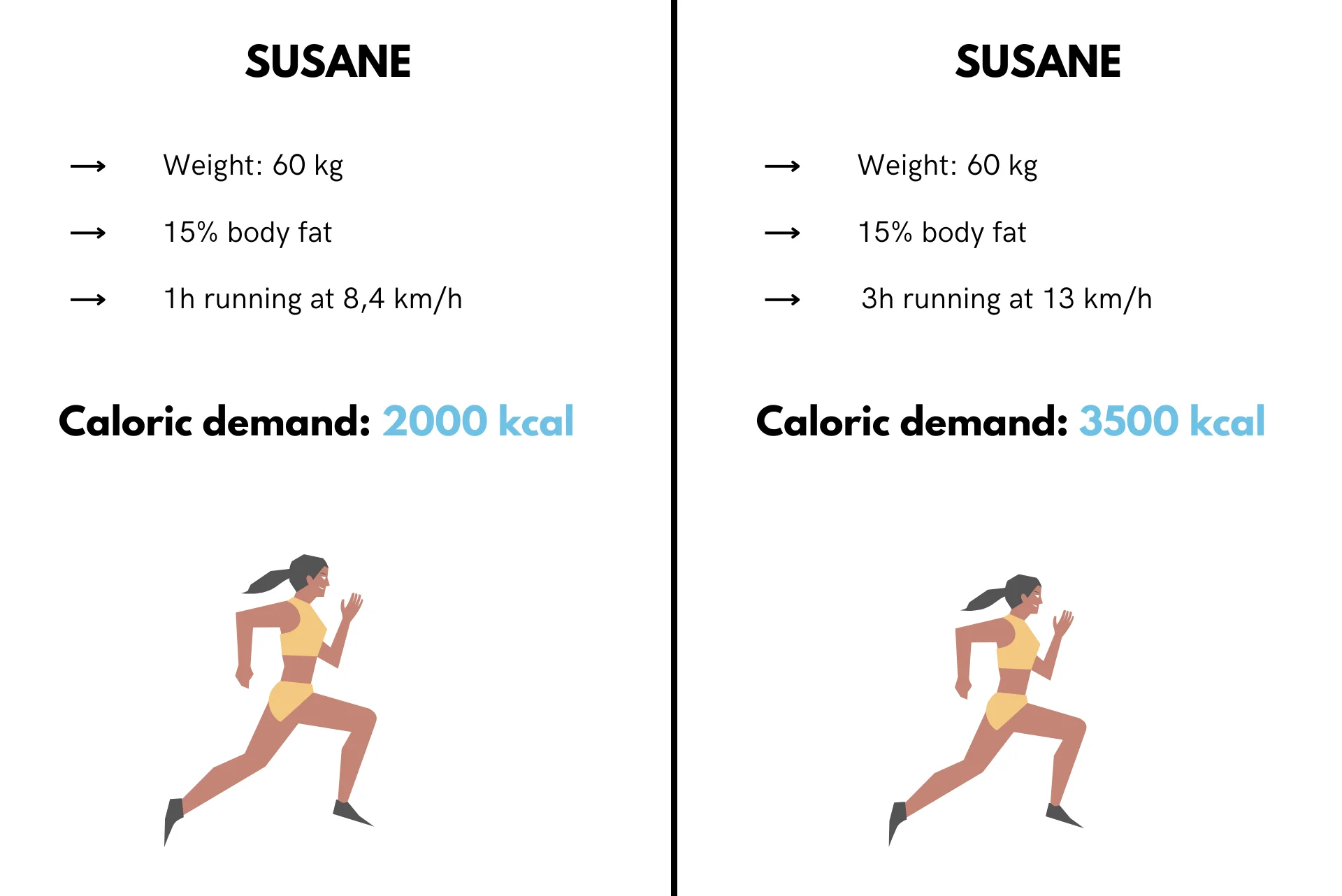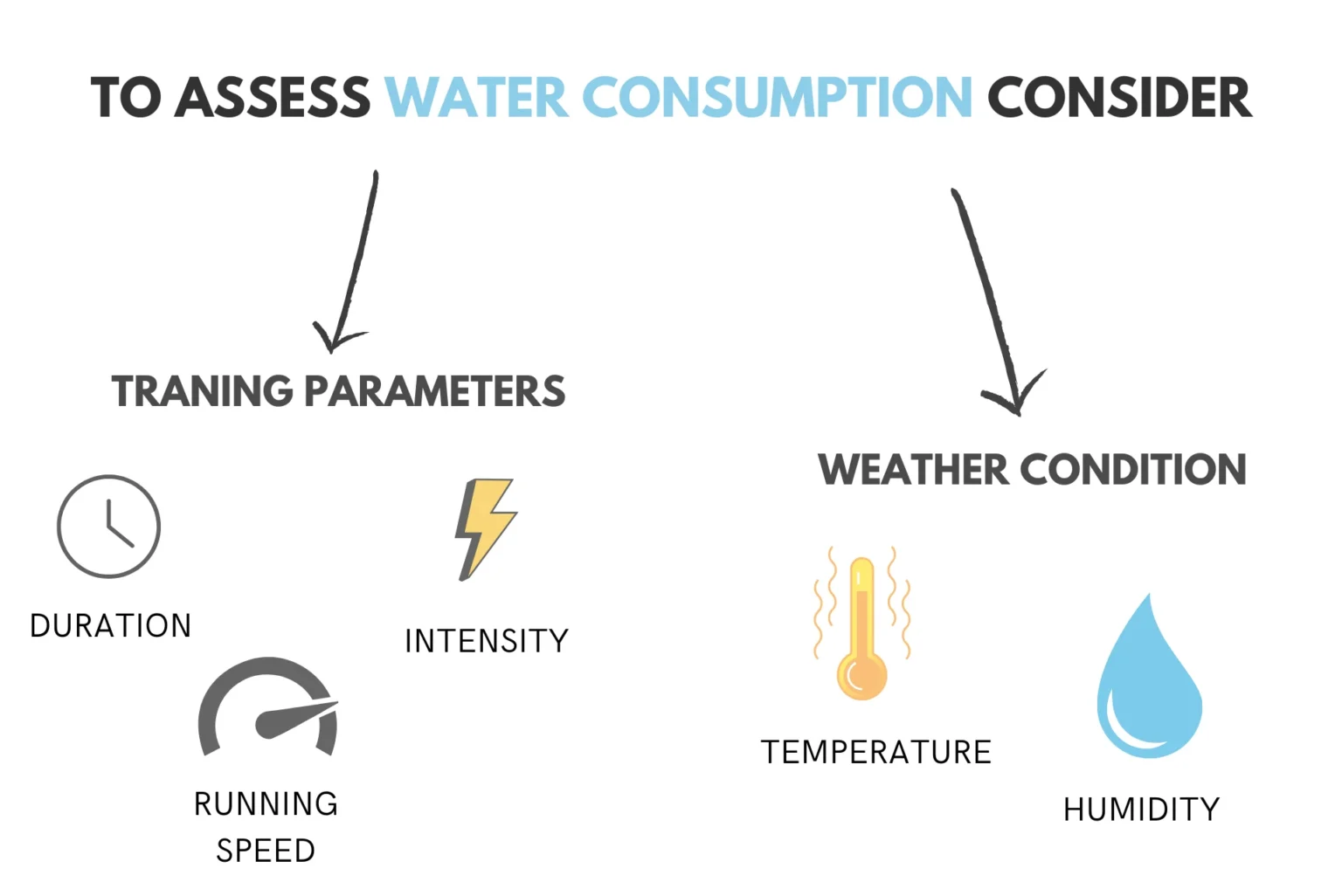
Long distance running has gained increasing popularity in recent years. Every year, new runners set a goal to complete marathon. However, approximately 10-20% of them don’t reach finish line.
The main reason why so many runners fail to achieve their goal is poor preparation. Marathon is a huge burden for body. Besides, hours of running, proper nutrition is essential. In this article I will show you how to create marathon nutrition plan on your own.
Tabel of content
1. Before We Start
All the information in this article is based on scientific knowledge. The advices presented are sucessfull for most of people, however we are all different. Before making any changes to your diet, consult your doctor and dietician.
Marathon Nutrition Plan - Give Yourself Time
Preparing for a marathon takes weeks. This time allows you to experiment with every aspect of preparation from equipment to nutrition. By the day before the race you should already know excatly what you will eat before, during and after the marathon. In simple terms nothing new on race day unless you want to risk not finishing.

2. Caloric Demand on training days
,, Train as you fight, fight as you train ”
Marines
The same principle as Marines motto applies to marathon training. To meet increased caloric demand, marathon runner needs to consume more calories than average person.
Recommendations suggest consuming 40 to 70 kcal per kilogram of body weight per day to meet energy requirements of endurance sports like running
Number of calories you need depends on several factors like:
– Body mass
– Body fat percentage
– Running speed
– Training distance and duration
The more intense your training, the higher you caloric need.

3. Carbohydrates - The Main Source of Energy in Marathon Nutrition Plan
Human body can convert carbohydrates, fat and protein into energy. However, marathon runners should primarily rely on carbohydrates as they are the fastest energy source among macronutrients. The amount of carbohydrates a runner should consume depends on the duration and intensity of training.
To create an effective marathon nutrition plan, you should align your carbohydrate intake with your training schedule. Here are the general recommendations:
- Short training sessions (≤1 hour): 5-7 g of carbohydrates per kg of body weight per day
- Moderate training (1-3 hours): 7-10 g of carbohydrates per kg of body weight per day
- Intense training (≥4 hours): 10-12 g of carbohydrates per kg of body weight per day
Carbohadrates and caloric demand - Summary
- Marahon runners need more calories and carbohydrates than average person
- The required intake depends on body and training parameters
- The more intense the training, the higher caloric and carbohydrates demand
4. carb loading - essential strategy
Carb loading is a nutrition strategy that maximizes energy availability during a marathon. It involves increasing carbohydrates intake to fulfill glycogen storage in liver and muscles before the race. High glycogen level allows body to steadily produce energy for running.
Human body can store 400-600 g of glycogen in the liver and muscles. During activity, glycogen is converted into glucose to fuel muscles. Marathon runners use carb loading to:
- Enhance performance
- Ensure optimal energy availability
How much carbohadrates to eat for carb loading?
Experts recommend to consume 8-12 g of carbohadrates per kg body weight per day for 36-48 hours before the race to replenish glycogen stores.
What food to avoid during carb loading?
Not all carbohydrates are recommended in carb loading. You should avoid high-fiber carbohadrates like legumes, oats or whole grain bread. They increase the risk of digestive discomfort.

Your last meal before the marathon
Your pre-race meal is important for optimal performance. It should include 1-4 gram of carbohadrates per kg of body weight. Minimalize eating fats, protein and fiber to avoid GI issues
Carb loading - Summary
- Carb loading maximizes glycogen stores in liver and muscles
- Glycogen serves as energy source for runners
- Eat 8-12 g of carbs per kg of body weight 36-48 hours before the race
- Avoid high amount of fat, protein and fiber in your last meal
5. Caloric demand at marathon
As we mentioned earlier, running marathon is energy demand activity. Runners burn more than 2000 kcal before reaching the finish line. To achieve it, they need to consume calories both before and during the marathon. International Society of Sport Nutrition suggests consuming 150-300 kcal per hour during runs shorter than 81 km.
To meet the requirements you should consume carbohydrates in the form of:
- Gels
- Sport drinks
- Bananas
- Raisins
- Energy bars
One of the most popular marathon nutrition plan strategies among elite runners is the use of carbohadrate-rich gels. Gels are convenient, occupy less space than traditional food, and provide high amount of carbohydrates. Professional athletes consume typically one gel every 20 minutes of run to maintain performance.
6. Carbohydrates intake during marathon
The body’s limited glycogen stores forces runners to consume throughout the marathon. Proper supply of carbohydrates directly impact performance and post-race recovery.
How much carbohydrates should you consume?
Human body has limited capacity to absorb carbohydrates from the gastrointestinal (GI) tract. Maximum absorption rate is 90 g of carbohydrates per hour ,consisting 60g of glucose and 30g of fructose. However, consuming this amount without experiencing GI discomfort is challenging.
To deliever body adequate amount of carbohydrates without stomach issues, you need to test different fueling options. The tolerance for carbohydrate intake varies individually.
One study found that elite marathoners experienced GI tract issues after consuming 49-77 g of carbohydrates per hour. To optimize your marathon nutrition plan, determine your personal threshold before race day.
How to prevent GI tract issues during a marathon
Even though carbohydrates absorption is limited, we can reduce the negative effects of high carbohydrates intake. By gradually increasing consumption of carbohydrates at trainings, we improve rate of absorption. As a result more carbohydrates move from stomach into the bloodstream, where they can be used for energy production .
Benefits of improved carbohydrates absorption:
- Fewer GI tract issues
- Reduced muscle fatigue
- Less muscle damage after running
Advices
- Gradually increase carbohydrate intake during training
- Consume a mix of different carbohydrates to minimize stomach discomfort
7. Hydration
Human body is composed of 60-70% water, during a marathon, runner can lose up to 6% of body weight in the form of water. To prevent adverse effects of dehydration, optimal hydration strategy should be applied.
How much water is enough?
The American College of Sports Medicine recommends drinking
0,6 -1,2 l of water per hour during long-distance running. However, many runners find it challening to meet this requirement. Scientists observe that average runner consumes around 0,5 l of water per hour while running.
Proper hydration depends on several factors
The amount of water you need during running depends on several factors like:
- Training duration
- Training intensity
- Running speed
- Temperature
- Humidity
- Personal sweat rate

You cannot determine your optimal water intake without testing it under different conditions. It is important to recognize both dehydration and overhydration. Both states negatively impact performance. Prolonged dehydration or overhydration may lead to hypnoatremia or hypernatremia.
Methods to assess hydration status
Assessing hydration status is easier than you think. There are 3 simple methods:
- Comparing weight before and after a run
- Assessing urine color
- Evaluating thirst level
Comparison of weight
Weight loss is a great tool for assessing sweat rate under different conditions. It helps in preparing effective hydration plan for race day.
By tracking weight loss in different conditions, you can estimate how much water you need. To replenish lost of 1 kg of body mass you need 1,5 litre of water.
Assessment of urine color
Urine color is reliable indicator of hydration status. Dark urine color similar to apple juice or darker, suggests dehydration and the need for fluids. Observe your after running urine color to develop optimal hydration strategy.
Evaluation of thirst level
The best real-time indicator of dehydration during activity is thirst. When your mouth feels a dry or a headache develops, it is time to drink. Even a mild dehydration negatively effect performance.
Do I need electrolytes?
Optimal level of sodium, potassium or magnesium is essential for maintaining water-electrolyte balance. Endurance sports lasts for hours leading to sweat loss and a depletion of key minerals.
Marathon runners primarily lose sodium that why American College of Sports Medicine recommends consuming 0,5-0,7 g of sodium per liter of water.
Consuming electrolytes after marathon shouldn’t harm you. However, it is best to test your blood mineral levels before race day. By supplementing shortcomings before and consuming sodium during the race you avoid electrolyte imbalance.
Hydration - Summary
- Water intake depends on factors like training intensity and weather conditions
- Assess your hydration needs before the marathon
- Listen to your body’s signal during the marathon
- Maintain proper sodium leve
8. After marathon
At this stage you have finished marathon. You feel incredible and are planning to rest. However, there is one last thing to do, replenish your carbohydrates and protein level.
Carbohydrates intake after a marathon
After long runs, human body needs time to restore glycogen level. This process can take 20-24 hours but there is a simple way to speed it up. Consume 1-1,2 gram of carbohydrates per kilogram of body weight to replenish glycogen faster.
For even better results, combine carbohydrates with protein in your post-marathon meal. Consume 0,8 g of carbohydrates with 0,3-0,4 g of protein per kilogram of body weight to enhance glycogen replenishment and promote muscle recovery.
Great not nutrition way to accelarate muscle recovery is cold exposure.
9. Conclusion
Running a marathon is one of the most demanding yet rewarding challenges. The key factors that determine your success is consistency and good preparation. The information in this article serve as a guide to help you create your own marathon nutrition plan. Remember to experiment, learn from mistakes to create your perfect marathon plan. To impove post-running relaxation consider acupressure mat.
